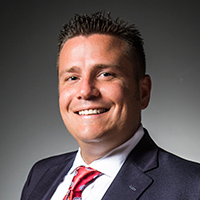Have You Outgrown Your Financial Professional?
Your needs change the closer you get to retirement, so even if you have a great financial adviser, the relationship may no longer be a good fit. How to tell when it's time to move on.


Profit and prosper with the best of Kiplinger's advice on investing, taxes, retirement, personal finance and much more. Delivered daily. Enter your email in the box and click Sign Me Up.
You are now subscribed
Your newsletter sign-up was successful
Want to add more newsletters?
I meet a lot of people who say they really value the advice they’ve gotten over the years from their financial professional.
They appreciate the help they received while saving for a house, trying to stay out of debt, getting their kids through college and accumulating their nest egg.
And yet, sometimes the same folks who say they “love” their advisers start to notice that they don’t necessarily have all the answers when it comes to retirement.
From just $107.88 $24.99 for Kiplinger Personal Finance
Become a smarter, better informed investor. Subscribe from just $107.88 $24.99, plus get up to 4 Special Issues

Sign up for Kiplinger’s Free Newsletters
Profit and prosper with the best of expert advice on investing, taxes, retirement, personal finance and more - straight to your e-mail.
Profit and prosper with the best of expert advice - straight to your e-mail.
That doesn’t mean their advisers aren’t good at what they do. It just means what they do is no longer a fit for their clients’ evolving needs.
In the second half of your financial life — when your focus flips from growing your money to preserving it and using it as income when you no longer have a paycheck — things can get pretty complicated. And retirement planning is growing ever more complex for a number of reasons, including:
- We’re living longer. According to the Social Security Administration, a man who reaches age 65 today can expect to live, on average, to 84. A woman turning age 65 today can expect to live, on average, to 86. And fewer and fewer retirees have pensions they can rely on for guaranteed income. It’s no wonder so many retirees say their No. 1 fear is that they’ll run out of money.
- The market is volatile, and mistakes can be costly at this stage of your life. If, like most people, the bulk of your savings is in a 401(k) or IRA and you suffer a loss, you won’t necessarily have the time or ability to recover your money. And that can have a serious effect on your lifestyle.
- Interest rates are unpredictable. Today’s retirees are caught between a rock and a hard place. Because interest rates have been so low, the “safe” products we used to count on in retirement, such as certificates of deposit, don’t pay enough to keep up with inflation. And in today’s rising interest rate environment, bonds aren’t as reliable as they used to be, either.
- Health care and long-term care costs are soaring. According to the latest estimate from Fidelity Benefits Consulting, a 65-year-old couple who retired in 2017 will need an average of $275,000 to cover medical expenses for the rest of their lives, up from $260,000 in 2016. Long-term care costs also continue to rise: The Genworth 2017 Cost of Care Survey found the annual median cost of long-term care services rose an average of 4.5% from 2016 to 2017. That’s nearly three times the 1.7% U.S. rate of inflation.
If your adviser isn’t educated, experienced and focused on getting you successfully to and through retirement, it may be time to make a change.
Here are four things your adviser should be making a priority:
- Making an income plan. In retirement, you have to create your own paycheck. You’ll get a boost from Social Security and your pension (if you have one), so your adviser should be up to date on the claiming strategies that benefit both you and your spouse. But you’ll also be depending on your own investments, and you’ll need a plan that keeps your money safe and in your pocket. That includes spending down your retirement accounts in the most tax-efficient manner.
- Protecting your nest egg. As we’ve seen from recent hiccups and corrections, the market can rise and fall without warning. To have a successful second half, you have to be prepared ‐ and that means adjusting your risk tolerance to suit your income needs in retirement. You also may want to look at alternative investments that offer additional diversification and can decrease your dependency on the stock market.
- Factoring in longevity. The goal in retirement is to set yourself up with dependable lifetime income — even if you live past 100. A retirement specialist can help you decide if purchasing an annuity makes sense in your overall plan and, if it does, can assist you in reading through the fine print and understanding the advantages and disadvantages of the various types of annuities available.
- Managing health care and long-term care costs. Many soon-to-be retirees think Medicare will cover all their medical costs once they turn 65. They’re in for a big surprise. Even if you’re in a Medicare health plan that covers a certain service or item, you generally have to pay a deductible and copayments. And there are limits to what you’ll get for long-term care. Your adviser should be able to discuss your best options when it comes to Medicare plans and what insurance products are available to cover costs if you or your spouse should need extra assistance.
If you’re getting close to retirement — or if you’re already there — the question isn’t so much whether you like, or even love, your current financial professional. It’s whether he or she is the best person to get you into and through retirement — which should be the best time of your life.
Is the advice you’re getting right now going to give you the future you’ve worked so hard for?
Kim Franke-Folstad contributed to this article.
The article and opinions in this publication are for general information only and are not intended to provide specific advice or recommendations for any individual. We suggest that you consult your accountant, tax, or legal adviser with regard to your individual situation.
Securities offered through Kalos Capital Inc. and Investment Advisory Services offered through Kalos Management Inc., both at 11525 Park Woods Circle, Alpharetta, GA 30005, (678) 356-1100. Retirement Income Strategies is not an affiliate or subsidiary of Kalos Capita, Inc. or Kalos Management Inc.
The appearances in Kiplinger were obtained through a PR program. The columnist received assistance from a public relations firm in preparing this piece for submission to Kiplinger.com. Kiplinger was not compensated in any way.
Profit and prosper with the best of Kiplinger's advice on investing, taxes, retirement, personal finance and much more. Delivered daily. Enter your email in the box and click Sign Me Up.

Kristian L. Finfrock is the founder of and a financial adviser at Retirement Income Strategies. He is an Investment Adviser Representative of Kalos Capital and a licensed insurance professional. He resides in Evansville, Wisconsin, with his two daughters.
-
 Americans, Even With Higher Incomes, Are Feeling the Squeeze
Americans, Even With Higher Incomes, Are Feeling the SqueezeA 50-year mortgage probably isn’t the answer, but there are other ways to alleviate the continuing sting of high prices
-
 Hiding the Truth From Your Financial Adviser Can Cost You
Hiding the Truth From Your Financial Adviser Can Cost YouHiding assets or debt from a financial adviser damages the relationship as well as your finances. If you're not being fully transparent, it's time to ask why.
-
 How to Manage a Disagreement With Your Financial Adviser
How to Manage a Disagreement With Your Financial AdviserKnowing how to deal with a disagreement can improve both your finances and your relationship with your planner.
-
 Are You Honest With Your Financial Adviser? Why Hiding the Truth Can Cost You
Are You Honest With Your Financial Adviser? Why Hiding the Truth Can Cost YouHiding assets or debt from a financial adviser damages the relationship as well as your finances. If you're not being fully transparent, it's time to ask why.
-
 5 Actions to Set Up Your Business With Your Exit in Mind, From a Wealth Adviser
5 Actions to Set Up Your Business With Your Exit in Mind, From a Wealth AdviserWhen you're starting a business, it may seem counterintuitive to begin with exit planning. But preparing will put you on a more secure footing in the long run.
-
 Missed Your RMD? 4 Ways to Avoid Doing That Again (and Skip the IRS Penalties), From a Financial Planner
Missed Your RMD? 4 Ways to Avoid Doing That Again (and Skip the IRS Penalties), From a Financial PlannerIf you miss your RMDs, you could face a hefty fine. Here are four ways to stay on top of your payments — and on the right side of the IRS.
-
 What Really Happens in the First 30 Days After Someone Dies (and Where Families Get Stuck)
What Really Happens in the First 30 Days After Someone Dies (and Where Families Get Stuck)The administrative requirements following a death move quickly. This is how to ensure your loved ones won't be plunged into chaos during a time of distress.
-
 AI-Powered Investing in 2026: How Algorithms Will Shape Your Portfolio
AI-Powered Investing in 2026: How Algorithms Will Shape Your PortfolioAI is becoming a standard investing tool, as it helps cut through the noise, personalize portfolios and manage risk. That said, human oversight remains essential. Here's how it all works.
-
 A Newly Retired Couple With a Portfolio Full of Winners Faced a $50,000 Tax Bill: This Is the Strategy That Helped Save Them
A Newly Retired Couple With a Portfolio Full of Winners Faced a $50,000 Tax Bill: This Is the Strategy That Helped Save ThemLarge unrealized capital gains can create a serious tax headache for retirees with a successful portfolio. A tax-aware long-short strategy can help.
-
 5 Retirement Myths to Leave Behind (and How to Start Planning for the Reality)
5 Retirement Myths to Leave Behind (and How to Start Planning for the Reality)Separating facts from fiction is an important first step toward building a retirement plan that's grounded in reality and not based on incorrect assumptions.
-
 I'm a Financial Adviser: Silence Is Golden, But It Hurts Your Heirs More Than You Think
I'm a Financial Adviser: Silence Is Golden, But It Hurts Your Heirs More Than You ThinkTalking to heirs about transferring wealth can be overwhelming, but avoiding it now can lead to conflict later. Here's how to start sharing your plans.